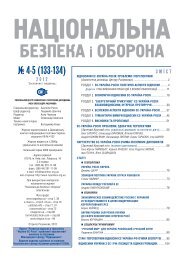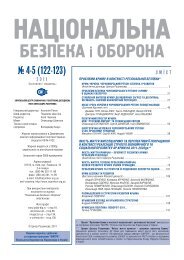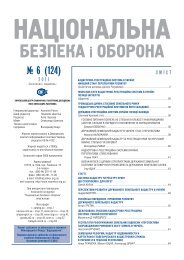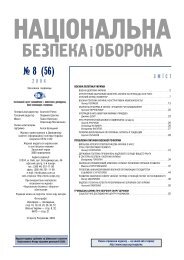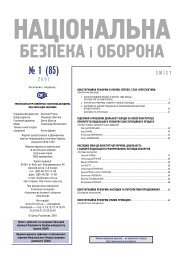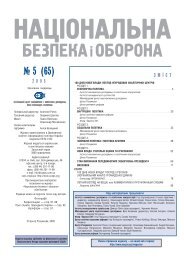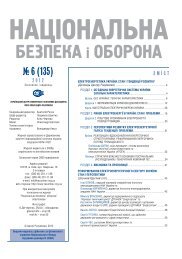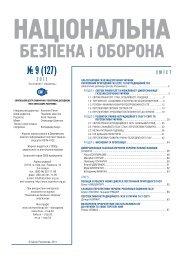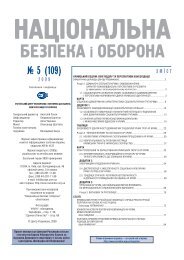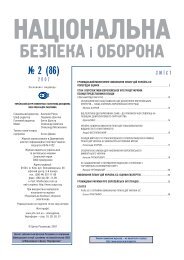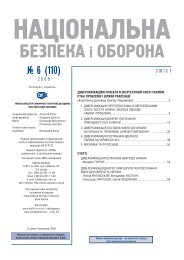RUSSIA THE EURASIAN CUSTOMS UNION AND THE EU COOPERATION STAGNATION OR RIVALRY?
RUSSIA, THE EURASIAN CUSTOMS UNION AND THE EU ...
RUSSIA, THE EURASIAN CUSTOMS UNION AND THE EU ...
- No tags were found...
You also want an ePaper? Increase the reach of your titles
YUMPU automatically turns print PDFs into web optimized ePapers that Google loves.
FOCUS GROUP RESULTS<br />
Particular interests of the <strong>EU</strong>. Among these interests,<br />
the discussion participants noted the <strong>EU</strong>’s interest in cheap<br />
manpower, imports of cheap electricity from Ukraine. Quite<br />
often the participants said that the <strong>EU</strong>’s interest was in the<br />
use of Ukrainian territory for stationing of environmentally<br />
hazardous enterprises, and burying radioactive and toxic<br />
waste.<br />
• Cheap manpower. We are not protected – so, we may be paid less<br />
(Kharkiv)<br />
• We have the cheapest electricity, many nuclear and hydropower<br />
plants (Zhytomyr)<br />
• They will place polluting enterprises, hazardous factories<br />
(Zhytomyr)<br />
• They will move their heavy industry here (Donetsk)<br />
• We will be Europe’s rubbish-dump (Zhytomyr)<br />
Meanwhile, according to many participants of a focus<br />
group, the <strong>EU</strong> will promote democracy development and<br />
market reforms in Ukraine in order to make the Ukrainian<br />
market more civilised and to protect their investments.<br />
• Certainly, the <strong>EU</strong> will promote market reforms in Ukraine to<br />
establish common standards of doing business (Zhytomyr)<br />
Particular interests of the Customs Union. The discussion<br />
participants named the use of Ukraine’s transit potential, in<br />
particular, for oil and gas delivery across its territory.<br />
• For Russia, we are a transit territory, in the first place. In case of<br />
accession, the transit fee will be cancelled (Kharkiv)<br />
At the same time, some focus group participants spoke of<br />
the Customs Union’s interest in import of Ukrainian products.<br />
• Moderator: What Ukrainian products may the Customs Union<br />
consume, or import?<br />
• First of all, agricultural produce.<br />
• Metallurgy.<br />
• Space industry. Aircraft building (Kharkiv)<br />
Incentives for choosing<br />
Ukraine’s integration trajectory<br />
Ukraine’s integration in the <strong>EU</strong> or the Customs Union<br />
was often seen as a civilisational choice, a choice between<br />
the European and Eastern (Eurasian) civilisations.<br />
• Choice between the Western civilisation and the Eastern model.<br />
Between democracy, and full absence of democracy in the East<br />
(Simferopol)<br />
On the one hand, some of the discussion participants<br />
noted that Ukraine’s civilisational choice is not an argument<br />
for a multinational country whose regions have different<br />
civilisational roots, past and historic memory:<br />
• Our people, both Russian and Ukrainian, are so mixed, some with<br />
Tatars, some with Rzeczpospolita for 200 years. There were so<br />
many different civilisations here that everyone will find and choose<br />
something for himself ( Kharkiv)<br />
Also noteworthy, some participants also mentioned<br />
personal motives in favour of joining the <strong>EU</strong> and the Customs<br />
Union alike:<br />
• The soul wants to join the Customs Union, but the mind wants to<br />
enter the <strong>EU</strong> (Donetsk)<br />
Incentives for joining the <strong>EU</strong>. The focus group<br />
discussions about the motives for accession to the <strong>EU</strong> and<br />
the Customs Union correspond to the results of the national<br />
public opinion poll. 2<br />
In particular, when favouring the <strong>EU</strong>, the focus group<br />
participants, as well as the poll respondents, were mainly<br />
guided by possible economic benefits, social development,<br />
and liberalisation of travel to the <strong>EU</strong> countries for Ukrainian<br />
citizens.<br />
Economic benefits were associated with the possibility<br />
to obtain new technologies, loans, modernisation, access<br />
to the European market for Ukrainian manufacturers,<br />
increased living standards.<br />
With respect to prospects of social development, the<br />
participants highlighted the social policy of the <strong>EU</strong> countries<br />
and expressed hope that integration in the <strong>EU</strong> would<br />
encourage the development of Ukraine’s social policy in line<br />
with European standards, promote democracy, rule of law and<br />
respect for human rights, and help overcoming corruption.<br />
Incentives for joining the Customs Union. Similar<br />
to respondents of the public opinion poll, the participants<br />
of the focus group often referred to a cultural and mental<br />
kinship (cultural kinship, unity of people, similar mentality,<br />
common history). When speaking about economic benefits<br />
the emphasis was not so much on the economic development<br />
but on the growth of markets, cheaper energy resources,<br />
reduced or cancelled customs duties; creation of new<br />
working places, increase in living standards to an average<br />
level of the Customs Union).<br />
When discussing the incentives for joining the Customs<br />
Union, none of the participants mentioned development of<br />
democracy, rule of law and respect for human rights.<br />
Conditions and prospects<br />
for implementing the Association<br />
Agreement and effects of its signing<br />
The participants were rather pessimistic when assessing<br />
the chances of meeting the terms and conditions of the<br />
Agreement. Quite often they said that the association with<br />
the <strong>EU</strong> did not offer Ukraine any economic benefits but, on<br />
the contrary, called for fulfilment of the conditions aimed<br />
at long-term solutions of social problems.<br />
At that, the participants said, the Ukrainian elite (i.e.,<br />
politicians, oligarchs, officials) would by all means obstruct<br />
the reforms necessary for Ukraine’s integration with the <strong>EU</strong>,<br />
since their implementation might substantially restrict their<br />
powers:<br />
• Politicians will sign the Agreement but do nothing [to implement it]<br />
(Kyiv, Simferopol)<br />
On the other hand, some discussion participants stressed<br />
that the <strong>EU</strong> was not interested in Ukraine’s integration<br />
and, therefore, had put forward tough conditions for<br />
signing the Association Agreement. Europe does not<br />
want to bring Ukraine – a country with complex social<br />
and economic problems – any closer, to open borders for<br />
millions of potential migrants:<br />
• Europe does not want us. I agree that we are a heavy burden for<br />
them. Do you understand? They will have to help us solve our<br />
problems (Lviv)<br />
• There was a public opinion poll saying that 67% of the population<br />
wants to leave Ukraine for permanent residence. They all will leave<br />
for Europe (Lviv)<br />
• Ukraine, with its corruption, is like a carcinoma for Europe, difficult<br />
to get rid of later (Zhytomyr)<br />
Overall effects of signing the Association Agreement.<br />
The participants view signing of the Association Agreement<br />
as the first step towards Ukraine’s integration with the <strong>EU</strong>,<br />
and they often found it difficult to distinguish between<br />
the effects of signing of the Association Agreement and<br />
Ukraine’s accession to the <strong>EU</strong>.<br />
Among the advantages of signing the Agreement, they<br />
mentioned:<br />
• development of democracy, improvement of the situation<br />
with human rights;<br />
• improvement of the legislation;<br />
• assistance with fight against corruption;<br />
• possibility of a visa-free travel to the <strong>EU</strong> countries;<br />
• creation of favourable conditions for dovelopment of the<br />
national economy: legislation that promotes enterprise<br />
development, credits for enterprise development, access<br />
to <strong>EU</strong> markets;<br />
• growth of social standards (social security, high level of<br />
medical services)<br />
2 For more detail see the material “Customs Union or Europe? The public<br />
opinion”, published in this journal.<br />
RAZUMKOV CENTRE • NATIONAL SECURITY & DEFENCE • №4-5, 2013 • 101



